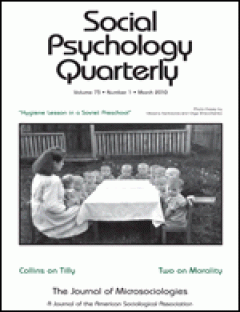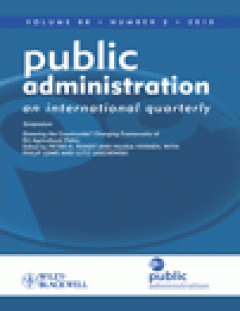Filter by

Dual Faces of Ministerial Leadership in South Korea: Does Political Responsiv…
This study is designed to examine dual faces of ministerial leadership that functions in the gray area of politics and administration when a minister performs his or her role as a political appointee and as a department head. The dual faces of ministerial leadership require somehow both political responsiveness and administrative responsibility for effective ministerial performance. Using the p…
- Edition
- Vol. 42, No. 1 Suppl, April 2010. pp. 77S-101S
- ISBN/ISSN
- 00953997
- Collation
- -
- Series Title
- Administration & Society
- Call Number
- -

THE ECONOMIC CRISIS AND AFTER: Recovery, reconstruction and cultural studies
This introductory article engages with possibilities for cultural studies during the economic crisis of 2008 and its aftermath. It begins by considering the nature of the crisis and the recovery that follows. It goes on to explore the relationship between cultural studies and economic discourse, arguing that the cultural studies of the economy and the 'economic' has always taken place in refere…
- Edition
- Volume 24, Issue 3 May 2010 , pages 283 - 294
- ISBN/ISSN
- 09502386
- Collation
- -
- Series Title
- Cultural Studies
- Call Number
- -

THE GOOD, THE BAD, AND THE UGLY: Economies of parable
The recent financial crisis has shattered lives and spread misery far and wide. The magnitude of damage has produced the desire for the economic equivalent of a truth and reconciliation commission. Yet the efforts to get the story right have pointed as much to a crisis of narrative, of theory, even of facticity among the standard-bearers of monied matters, public punditry and policy self-justif…
- Edition
- Volume 24, Issue 3 May 2010 , pages 418 - 430
- ISBN/ISSN
- 09502386
- Collation
- -
- Series Title
- Cultural Studies
- Call Number
- -

CREATIVE INDUSTRIES DEBATE: Unfinished business: labour, management, and the …
In what follows I am going to argue that the rise of the creative industries has in general been understood too narrowly. This narrow understanding has had implications for the way that a politics of management and labour in the creative industries has been framed and contained, and it has held back an analysis of class struggle in the creative industries. To elaborate an understanding of labou…
- Edition
- Volume 24, Issue 3 May 2010 , pages 431 - 444
- ISBN/ISSN
- 09502386
- Collation
- -
- Series Title
- Cultural Studies
- Call Number
- -

Helping Behavior, Dispositional Empathic Concern, and the Principle of Care
This research investigates the relative strength of two correlates of helping behavior: dispositional empathic concern and a moral principle to care about others. The empathy�helping and care�helping relationships are investigated using data from the General Social Survey, a nationally representative random sample of the U.S. adult population. Ten helping behaviors are investigated. The results…
- Edition
- Vol. 73, No. 1, March 2010. pp. 11-32
- ISBN/ISSN
- 01902725
- Collation
- -
- Series Title
- Social Psychology Quarterly
- Call Number
- -

Why Liberals and Atheists Are More Intelligent
The origin of values and preferences is an unresolved theoretical question in behavioral and social sciences. The Savanna-IQ Interaction Hypothesis, derived from the Savanna Principle and a theory of the evolution of general intelligence, suggests that more intelligent individuals may be more likely to acquire and espouse evolutionarily novel values and preferences (such as liberalism and athei…
- Edition
- Vol. 73, No. 1, March 2010. pp. 33-57
- ISBN/ISSN
- 01902725
- Collation
- -
- Series Title
- Social Psychology Quarterly
- Call Number
- -

Do You See What I Am?: How Observers’ Backgrounds Affect Their Perceptions …
Although race is one of the most salient status characteristics in American society, many observers cannot distinguish the racial ancestries of multiracial youth. This paper examines how people perceive multiracial adolescents: specifically, I investigate whether observers perceive the adolescents as multiracial and whether these racial perceptions are congruent with the multiracial adolescents…
- Edition
- Vol. 73, No. 1, March 2010. pp. 58-78
- ISBN/ISSN
- 01902725
- Collation
- -
- Series Title
- Social Psychology Quarterly
- Call Number
- -

Estimating Risk: Stereotype Amplification and the Perceived Risk of Criminal …
This paper considers the process by which individuals estimate the risk of adverse events, with particular attention to the social context in which risk estimates are formed. We compare subjective probability estimates of crime victimization to actual victimization experiences among respondents from the 1994 to 2002 waves of the Survey of Economic Expectations (Dominitz and Manski 2002). Using …
- Edition
- Vol. 73, No. 1, March 2010. pp. 79-104
- ISBN/ISSN
- 01902725
- Collation
- -
- Series Title
- Social Psychology Quarterly
- Call Number
- -

POLICY-LEARNING AND ENVIRONMENTAL POLICY INTEGRATION IN THE COMMON AGRICULTUR…
This article uses the Advocacy Coalition Framework (ACF) (Sabatier and Jenkins-Smith 1999; Weible and Sabatier 2007) and a refined version of the social learning approach of Peter Hall (1993) to assess and explain policy change in the Common (Agricultural) Policy (CAP) with a special view on Environmental Policy Integration (EPI). Three stages of EPI are discerned that move from central to vert…
- Edition
- Volume 88 Issue 2, June 2010. Pages 296 - 314
- ISBN/ISSN
- 00333298
- Collation
- -
- Series Title
- Public Administration
- Call Number
- -

INTRODUCTION: GREENING THE COUNTRYSIDE? CHANGING FRAMEWORKS OF EU AGRICULTURA…
In response to wide-ranging criticism of agricultural policy, especially within Western industrialized countries, new frameworks of justification are emerging and new hybrid policy fields have been established to tackle some of the 'externalities' of agricultural support. However, institutional frameworks are proving slower to change, partly because this would require coordinated action across …
- Edition
- Volume 88 Issue 2, June 2010. Pages 287 - 295
- ISBN/ISSN
- 00333298
- Collation
- -
- Series Title
- Public Administration
- Call Number
- -

POWER LEARNING OR PATH DEPENDENCY? INVESTIGATING THE ROOTS OF THE EUROPEAN FO…
A key motive for establishing the European Food Safety Authority (EFSA) was restoring public confidence in the wake of multiplying food scares and the BSE crisis. Scholars, however, have paid little attention to the actual political and institutional logics that shaped this new organization. This article explores the dynamics underpinning the making of EFSA. We examine the way in which learning…
- Edition
- Volume 88 Issue 2, June 2010. Pages 315 - 330
- ISBN/ISSN
- 00333298
- Collation
- -
- Series Title
- Public Administration
- Call Number
- -

BEYOND POLICY NETWORKS: POLICY FRAMING AND THE POLITICS OF EXPERTISE IN THE 2…
For the past decade, the policy community/issue network typology of pressure group interaction has been used to explain policy outcomes and the policy-making process. To re-examine the validity of this typology, the paper focuses on the UK government's response to the 2001 Foot and Mouth Disease (FMD) crisis, and in particular the decision to pursue contiguous culling rather than vaccination to…
- Edition
- Volume 88 Issue 2, June 2010. Pages 331 - 345
- ISBN/ISSN
- 00333298
- Collation
- -
- Series Title
- Public Administration
- Call Number
- -

THE FIGHT OVER DANISH NATURE: EXPLAINING POLICY NETWORK CHANGE AND POLICY CHANGE
The policy network approach is widely recognized for its ability to describe different networks. Adding the concepts 'policy image' and 'cleavage in the party system' makes it possible to explain policy network change as well as policy change. This argument is supported by a comparison of the Danish decision in 1960 to straighten Denmark's largest river, the Skjern River, to gain farmland, and …
- Edition
- Volume 88 Issue 2, June 2010. Pages 346 - 363
- ISBN/ISSN
- 00333298
- Collation
- -
- Series Title
- Public Administration
- Call Number
- -

THE FIGHT OVER DANISH NATURE: EXPLAINING POLICY NETWORK CHANGE AND POLICY CHANGE
The policy network approach is widely recognized for its ability to describe different networks. Adding the concepts 'policy image' and 'cleavage in the party system' makes it possible to explain policy network change as well as policy change. This argument is supported by a comparison of the Danish decision in 1960 to straighten Denmark's largest river, the Skjern River, to gain farmland, and …
- Edition
- Volume 88 Issue 2, June 2010. Pages 346 - 363
- ISBN/ISSN
- 00333298
- Collation
- -
- Series Title
- Public Administration
- Call Number
- -

MEETING THE CHALLENGE OF MARGINALIZATION PROCESSES AT THE PERIPHERY OF EUROPE
Under the influence of the enlargement of the European Union, there is now a renewed concern for marginalization processes in rural areas. Especially in countries at the periphery of Europe, these processes often have a large-scale and multifaceted character. As agriculture and rural areas have become dissociated, the marginalization or success of the one no longer necessarily affects the other…
- Edition
- Volume 88 Issue 2, June 2010. Pages 364 - 380
- ISBN/ISSN
- 00333298
- Collation
- -
- Series Title
- Public Administration
- Call Number
- -

EXIT, VOICE, AND DISAPPOINTMENT: MOUNTAIN DECLINE AND EU COMPENSATORY RURAL P…
The article analyses the Spanish experience of EU compensatory rural policy in order to contribute to broader debates on the effectiveness of this kind of policy and the role of agriculture in the definition of European rural policies. In the case of Spain, compensatory allowances to mainly mountain farmers had little effect on economic trajectories or social cohesion because of the small sums …
- Edition
- Volume 88 Issue 2, June 2010. Pages 381 - 395
- ISBN/ISSN
- 00333298
- Collation
- -
- Series Title
- Public Administration
- Call Number
- -

APPLYING POLICY NETWORK THEORY TO POLICY-MAKING IN CHINA: THE CASE OF URBAN H…
In this article, we explore whether policy network theory can be applied in the People's Republic of China (PRC). We carried out a literature review of how this approach has already been dealt with in the Chinese policy sciences thus far. We then present the key concepts and research approach in policy networks theory in the Western literature and try these on a Chinese case to see the fit. We …
- Edition
- Volume 88 Issue 2, June 2010. Pages 398 - 417
- ISBN/ISSN
- 00333298
- Collation
- -
- Series Title
- Public Administration
- Call Number
- -

EXPLAINING VARIATION IN PERCEPTIONS OF RED TAPE: A PROFESSIONALISM-MARKETIZAT…
In the public administration literature, ways in which perceptions of red tape vary between different parts of the public sector remains relatively unexplored. In this article we define organizational red tape as a subject-dependent concept; that is, we expect to see variations in the level and type of red tape between different internal stakeholder groups. We then explain variations with two o…
- Edition
- Volume 88 Issue 2, June 2010. Pages 418 - 438
- ISBN/ISSN
- 00333298
- Collation
- -
- Series Title
- Public Administration
- Call Number
- -

STRONG LEADERS? THE CHALLENGES AND PITFALLS IN MAYORAL LEADERSHIP
The questions executive mayors face regarding the fulfillment of their leadership role often reveal dilemmas and paradoxes. The subject of this article is how executive mayors cope with these dilemmas and paradoxes and whether or not the selection procedure matters. It presents results of a comparison of English elected mayors' interpretations of three dilemmas and Dutch appointed mayors' expec…
- Edition
- Volume 88 Issue 2, June 2010. Pages 439 - 454
- ISBN/ISSN
- 00333298
- Collation
- -
- Series Title
- Public Administration
- Call Number
- -

THE DEGREE OF DECENTRALIZATION AND INDIVIDUAL DECISION MAKING IN CENTRAL GOVE…
This article reports a comparative study of human resource management (HRM) practices in Europe. We focus on the extent to which decision-making authority is decentralized, that is, passed down to management, and individualized in the sense of being in the discretion of a single decision maker. Using these two dimensions, this paper gives a picture of the distinct way HR decision-making practic…
- Edition
- Volume 88 Issue 2, June 2010. Pages 455 - 478
- ISBN/ISSN
- 00333298
- Collation
- -
- Series Title
- Public Administration
- Call Number
- -
 Computer Science, Information & General Works
Computer Science, Information & General Works  Philosophy & Psychology
Philosophy & Psychology  Religion
Religion  Social Sciences
Social Sciences  Language
Language  Pure Science
Pure Science  Applied Sciences
Applied Sciences  Art & Recreation
Art & Recreation  Literature
Literature  History & Geography
History & Geography